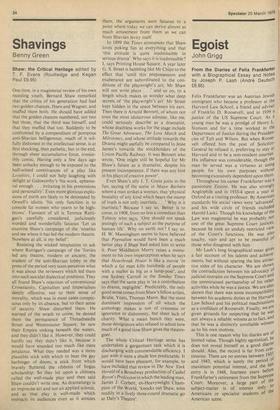Shavings
Benny Green
Shaw: the Critical Heritage edited by T. F. Evans (Routledge and Kegan Paul £9.95) One time, in a magisterial review of his own receding youth, Bernard Shaw remarked that the critics of his generation had had two golden chances. Ibsen and Wagner, and muffed them both. He should have added that the golden chances numbered, not two but three, that the third was himself, and that they muffed that too. Suddenly to be confronted by a compendium of pompous anti-Shavian belligerence, much of it wilfully dishonest in the intellectual sense, is at first shocking, then pathetic, but in the end, through sheer accumulative force, irresistibly comic. Having only a few days ago been unlucky enough to be exposed to the half-witted contrivances of a play like Loyalties, I could not help laughing with delight at Galsworthy's 'his work, ephemeral enough . . irritating in his pretensions and personality'. Even more glorious explosions of mirth are likely to be detonated by Orwell's idiotic 'his only function is to console fat women who yearn to be highbrows'. Funniest of all is Terence Rattigan's carefully considered, judiciously worded and wonderfully fatuous 'Let us examine Shaw's campaign of the 'nineties and see where it has led the modern theatre. Nowhere at all, is my belief'.
Resisting the wicked temptation to ask where Rattigan's campaign of the 'forties led any theatre, modern or ancient, the student of the anti-Shavian lobby in the press of the period very soon perceives what it was about the reviewers which led them into such suicidal dialectical positions. They all found Shaw's rejection of conventional Crosstianity, Capitalism and Imperialism deeply offensive, not to their sense of morality, which was in most cases conspicuous only by its absence, but to their sense of security. Shaw disturbed them. He warned of the wrath to coiine, he denied them the permanence of Threadneedle Street and Westminster Square, he saw their Empire sinking beneath the waters, and they didn't like it. However, they could hardly say they didn't like it, because it would have sounded too much like mere petulance. What they needed was a more plausible stick with which to beat the gay harbinger of doom, a stick from which bravely fluttered the ribbons of bogus scholarship. So they hit upon a chimera called the well-made play and then said Shaw couldn't write one. As dramaturgy is an imprecise art and not an applied science, and as that play is well-made which instructs its audiences even as it amuses them, the arguments were fatuous to a point where today we can derive almost as much amusement from them as we can from Shavian levity itself.
In 1899 the Times announces that Shaw loves poking fun at .everything and that 'this attitude is quite inadmissible in serious drama'. Who says it is inadmissible? I, says Printing House Square. A year later G. S. Street is babbling like Mr Chips to the effect that `until this prepossession and exuberance are subordinated to the conditions of the playwright's art, Mr Shaw will not write plays . . .' and so on, to a length which makes us wonder what deep secrets of 'the playwright's art' Mr Street kept hidden in the space between his ears. Then there is Arnold Bennett, of whom not even the most idolatrous admirer, like me, could seriously describe as a dramatist, whose deathless works for the stage include The Great Adventure, The Love Match and Milestones, and whose attitude towards the Drama might usefully be compared to Jesse James's towards the stockholders of the Union Pacific Railway. It was Bennett who wrote, 'One might still be hopeful for Mr Shaw's future as a dramatist, despite his present incompetence, if there was any hint in his plays of creative power'.
Even Shaw's ally J. T. Grein joins in the fun, saying of the scene in Major Barbara where a man strikes a woman, that 'physical brutality of any kind which bears the stamp of truth is not only inartistic . . .' Why is it inartistic? Because I say so. Better is to come, in 1908, from no less a comedian than Tolstoy who says, 'One should not speak jestingly of such a subject as the purpose of human life'. Why on earth not ? I say so.
H. W. Massingham seems to have believed that Pygmalion would have been a much better play if Shaw had asked him to write it. Poor Middleton Murry raises a monument to his own imperception when he says that Heartbreak House is like a movie 'in which a fat man kills hundreds of people with a mallet as big as a lamp-post', and one Sydney Carroll in the Sunday Times says that the same play is 'as a contribution to drama, negligible'. Predictably, the only good sense comes from Shaw's fellow artists, Bridie, Yeats, Thomas Mann. But the most dominant impression of all which the anthology makes is not of crassness or ignorance or dishonesty, but sheer lack of charity. What a mean bunch they were, those denigrators who refused to admit how much of a good time Shaw gives the theatregoer.
The whole Critical Heritage series has undertaken a gargantuan task which it is discharging with commendable efficiency. I just wish it were a shade less predictable. It would have been pleasant, for example, to have included that review in The New York Herald of a Broadway production of Cashel Byron's Profession in which the leading man, James J. Corbett, ex-Heavyweight Champion of the World, 'knocks out Shaw, wins readily in a lively three-round dramatic go at Daly's Theatre'.


































 Previous page
Previous page